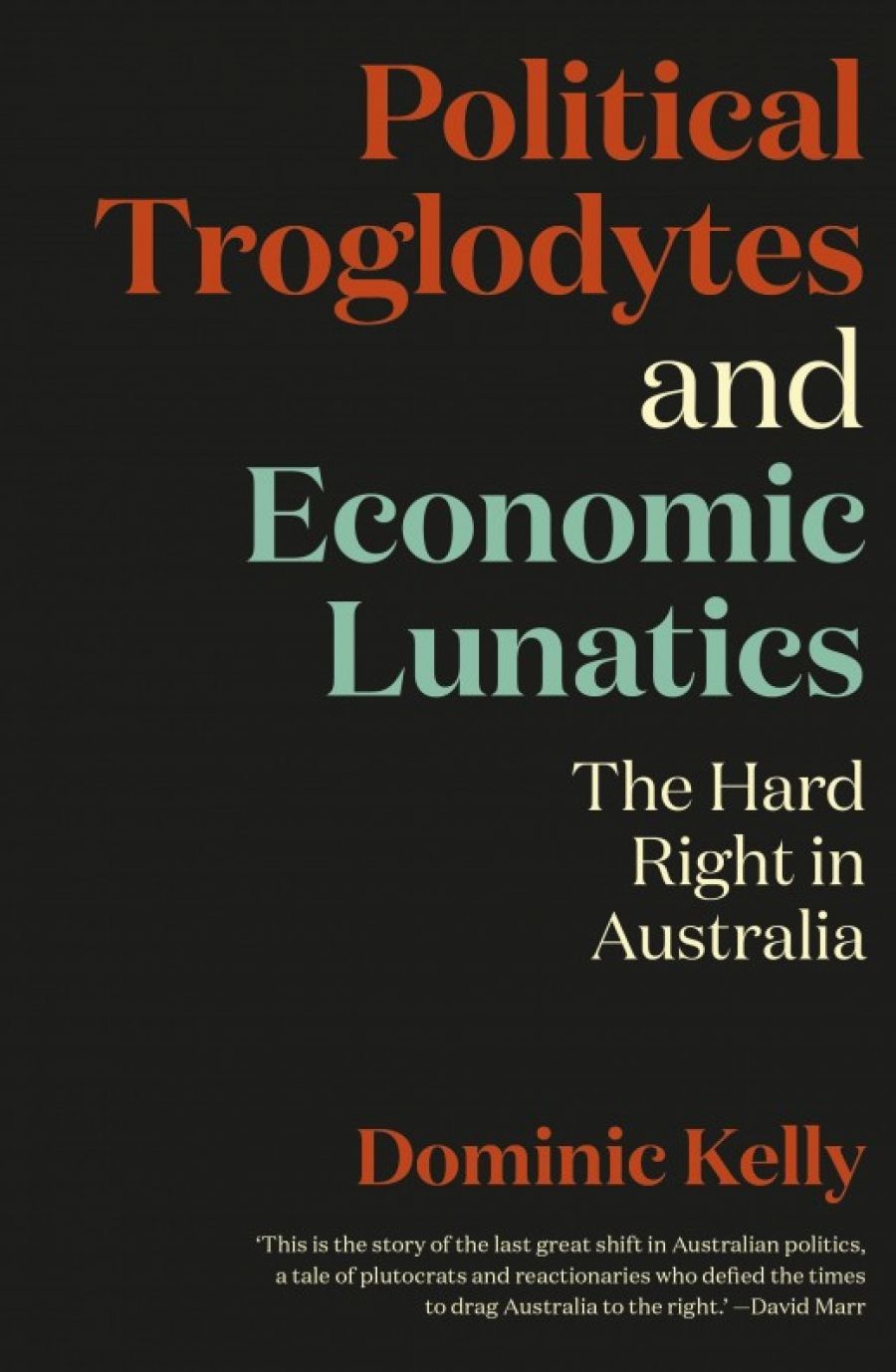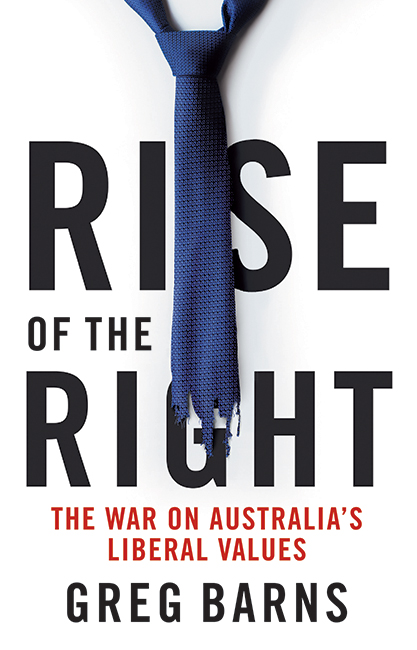
- Free Article: No
- Contents Category: Politics
- Custom Article Title: Andrew Broertjes reviews <em>Political Troglodytes and Economic Lunatics</em> by Dominic Kelly and <em>Rise of the Right</em> by Greg Barns
- Custom Highlight Text:
In the last four decades, a shift has occurred away from the post-World War II consensus around the role of the state. Conservative parties dominated by neo-liberal agendas have surged, assisted by the abandonment of progressive politics by centre-left parties such as Labour in the United Kingdom, the Democrats in the United States ...
- Book 1 Title: Political Troglodytes and Economic Lunatics
- Book 1 Subtitle: The hard right in Australia
- Book 1 Biblio: La Trobe University Press, $32.99 pb, 277 pp, 9781760641092
- Book 2 Title: Rise of the Right
- Book 2 Subtitle: The war on Australia's liberal values
- Book 2 Biblio: Hardie Grant Books, $24.99 pb, 154 pp, 9781743795422
- Book 2 Cover Small (400 x 600):

- Book 2 Cover (800 x 1200):

- Book 2 Cover Path (no longer required): images/ABR_Digitising_2019/April_2019/Rise_of_the_Right.jpg
The 1980s were lean times for these organisations in Australia. While great strides were being made by similar groups in the United States under Ronald Reagan and in the United Kingdom under Margaret Thatcher, Australia was dominated by the modernising forces of Labor under Bob Hawke and Paul Keating. Indeed, it was Hawke who dismissed the members of H.R. Nicholls as being ‘political troglodytes and economic lunatics’. They were taking friendly fire as well:
In an extraordinary intervention, Brian Powell, the chief executive of employer group the Australian Chamber of Manufacturers, accused members of the New Right of showing ‘truly fascist tendencies that make it harder and harder for us to negotiate change’. Powell’s comments led to a war of words between employer groups, revealing deep divisions between the new radicals and the old guard members of the IR Club.
 Bob Hawke elected President of the ACTU, Paddington Town Hall, Sydney, 10 September 1969 (photograph byUwe Kuessner/Australian Photographic Agency/Flickr)
Bob Hawke elected President of the ACTU, Paddington Town Hall, Sydney, 10 September 1969 (photograph byUwe Kuessner/Australian Photographic Agency/Flickr)
Groups like H.R. Nicholls and the Bennelong Society awaited a political saviour, and one finally came in the form of John Howard and the Coalition government. Howard and his ministers (most notably Peter Reith and former H.R. Nicholls member Peter Costello) moved quickly to halt and roll back the achievements of the Labor years. For the hard right, unwilling to accept the compromises of political process, even major pieces of legislation like Work Choices were too ‘tepid’, with the Liberal government seemingly unwilling to make tough choices and genuinely reform the system. The Bennelong Society, with its neo-assimilationist approach to Aboriginal affairs and its sponsorship of revisionist historian Keith Windschuttle, fared better, as Howard set a tone resolutely against the progress made during the Keating years. But the now-defunct Lavoisier Group provides one of the more interesting insights into our ‘post-truth’ world. Dismissed even by those on the hard right as being a fringe group obsessed with conspiracy theories around climate change, the Society seems to have been ahead of its time, particularly through its use of the internet and its collaborations with a ‘global web of climate denial’. As climate change accelerates and governments across the world flail in search of solutions, the muddying of the waters undertaken by groups like Lavoisier will have devastating long-term consequences.
Kelly, a critical but fair commentator, has interviewed a number of the major players involved in these organisations, including Ray Evans and John Stone. Political Troglodytes and Economic Lunatics is vital for anyone seeking a greater understanding of how we have reached this point in Australian politics.
While Dominic Kelly takes a level-headed approach to his subject, Greg Barns achieves the opposite. Some writers have an axe to grind. Barns has a veritable cornucopia of axes and grindstones. At times the reader wonders if Rise of the Right is a genuine attempt at understanding the rise of conservative populism, or merely a prolonged exercise in score-settling. Barns was an adviser to the Liberal Party before jumping to the Australian Democrats in the early 2000s, and later advising the WikiLeaks Party in their ill-fated 2013 campaign. His disgust with the Liberal Party runs deep, making him sound less like an erudite observer and more like an embittered former lover. It is a shame, because Barns does make a number of good points. His analysis of the role the media has played, particularly in the resurgence of Pauline Hanson and the relentless attacks on commentator Yassmin Abdel-Magied, is excellent. The Howard government’s cynical and opportunistic treatment of the Tampa ‘crisis’ of 2001 also earns a well-deserved serve:
The conduct of the Howard government itself was highly authoritarian. Ignoring the welfare of the asylum seekers, it breached well-known, time-honoured law and convention … the importance of the Tampa incident in plotting the decline of liberal values is self-evident. Australia had deliberately abandoned its obligations under international law.
Less convincing is the alarmism in comparing current events to the 1930s (which Barns quickly backpedals away from with ‘one must be circumspect and cautious in drawing a link between then and now’) and comparing politicians like Fraser Anning to Enoch Powell. There are also a number of minor errors scattered throughout the book (Margaret Thatcher was ousted from power in 1990, not 1991; Robert Menzies retired as prime minister in 1966, not 1965, and so on) and a few questionable assertions. While at times entertaining, Rise of the Right lacks the depth and rigour of Kelly’s work, failing to capture the importance of the political shifts that are upon us.


Comments powered by CComment